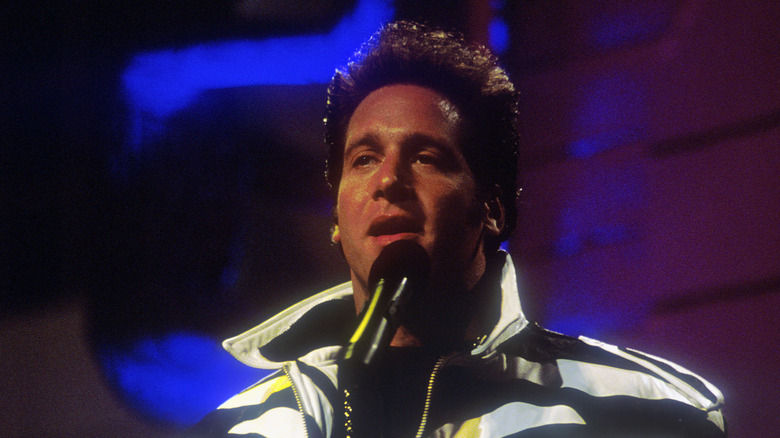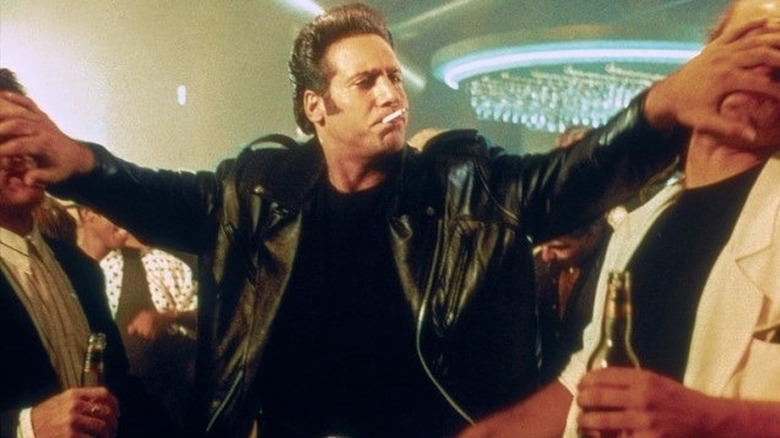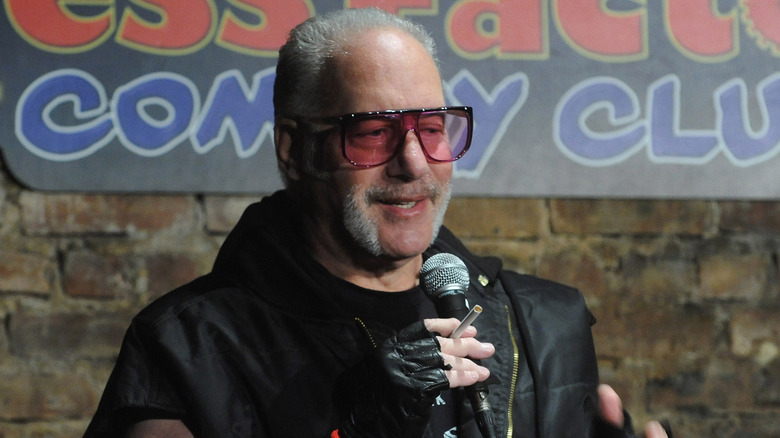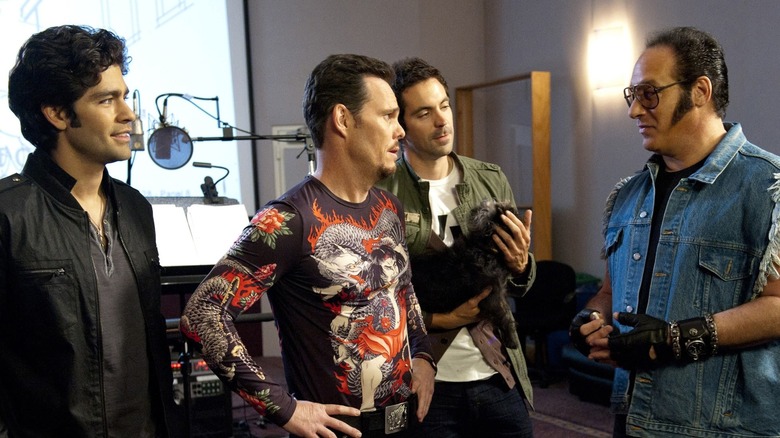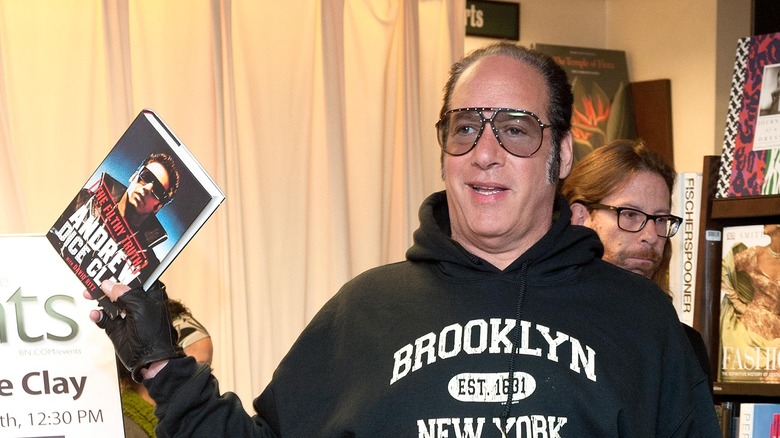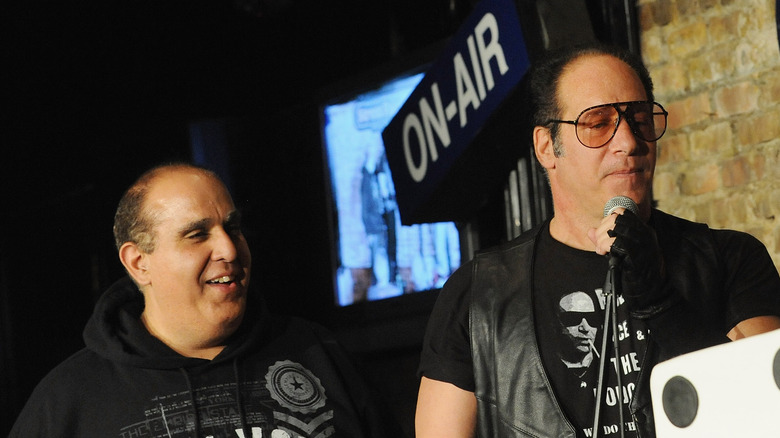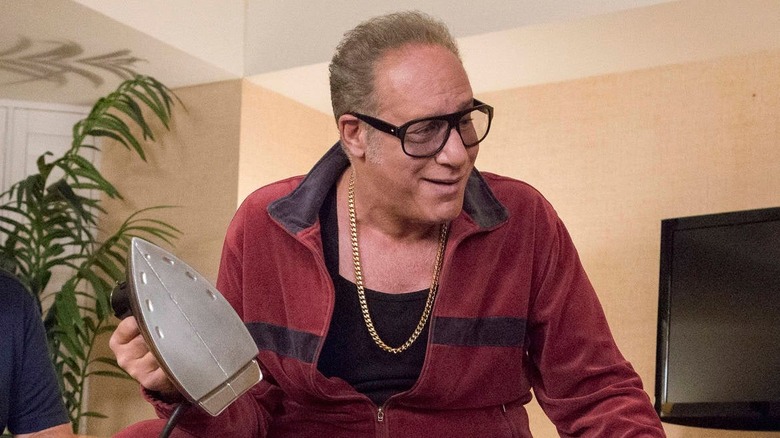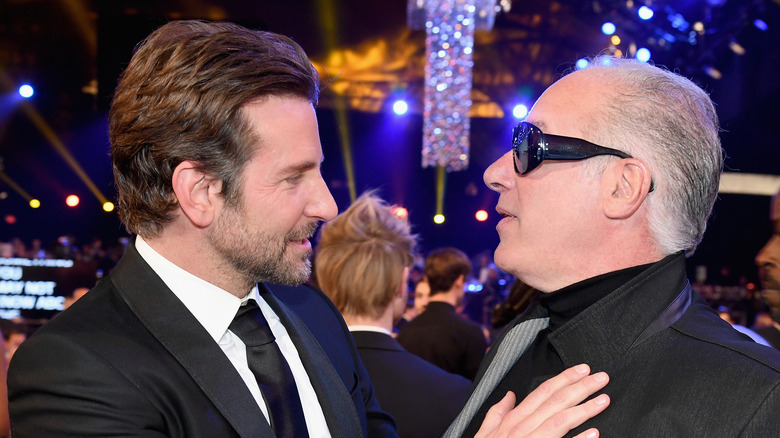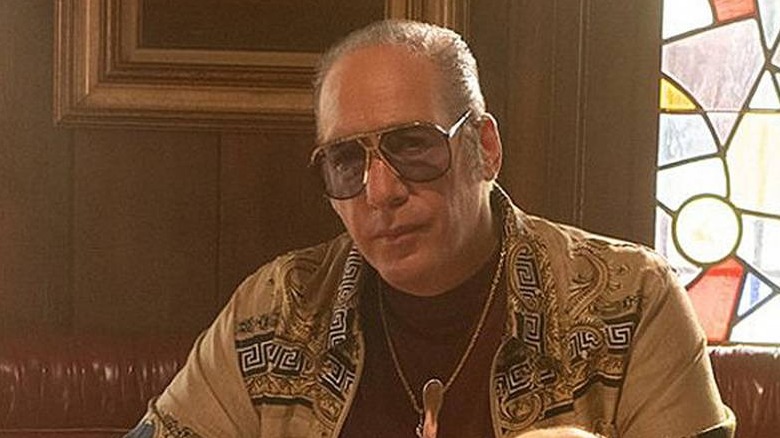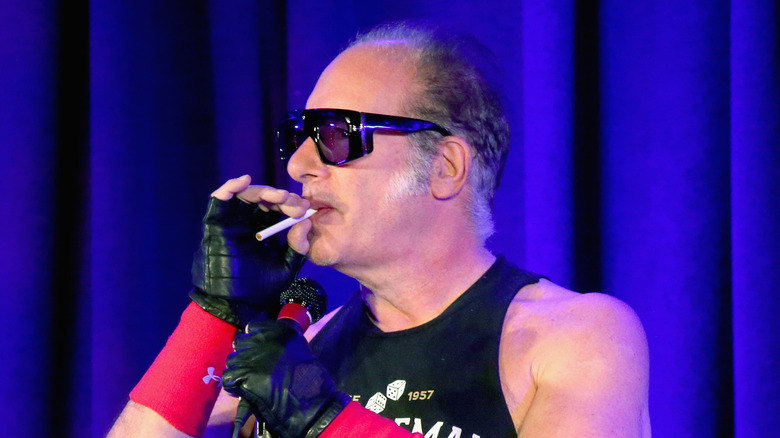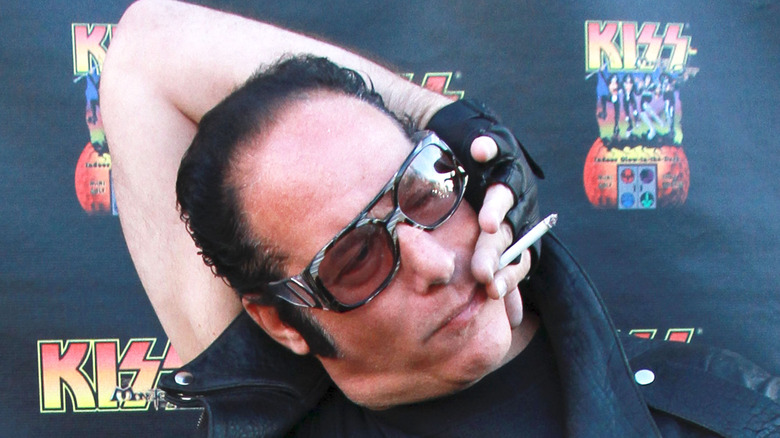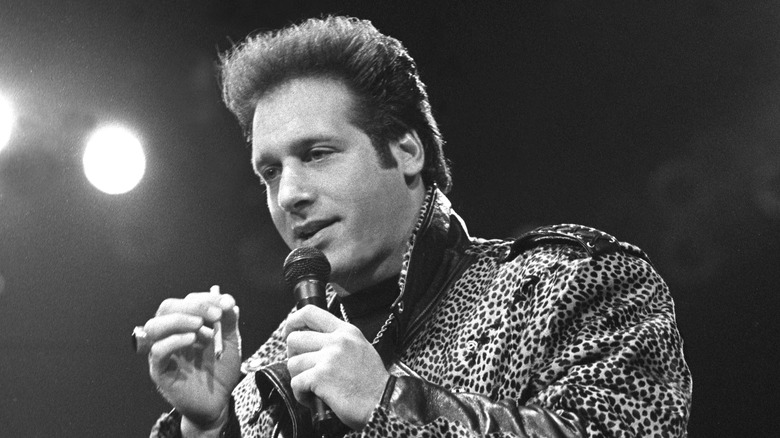Whatever Happened To Andrew Dice Clay?
At his peak, Andrew "Dice" Clay was the most successful, most controversial, and most outrageous stand-up comedian of his day. The former Andrew Clay Silverstein, a minor actor on shows like "Diff'rent Strokes" and in movies like "Pretty in Pink" for a decade, had successfully reinvented himself with a brash, intentionally offensive persona that was part Buddy Love, part Danny Zuko, moving from comedy clubs across the country to, most famously, a two-night sold-out engagement at Madison Square Garden (the first comedian to ever do so) that would yield the concert film "Dice Rules." Long before reality TV, his mere existence caused an endlessly arguable debate: Was he a parody of a Brooklyn, loudmouth Neanderthal? Or was this really him?
Misogynistic, homophobic, and offensive to nearly everyone, the popularity of "The Diceman" seemed to only increase every time someone tried to stop audiences from listening to him. His debut album "Dice" came with a parental advisory that simply read: "Warning: This album is offensive." With many retailers across the country unwilling (or unable) to sell it to minors, it became as desirable for that demo as any 2 Live Crew cassette. A 1989 appearance at the VMAs got him banned from MTV for life; a 1990 appearance hosting "Saturday Night Live" caused cast members to sit out in protest and forthcoming musical guests to back out of their appearances.
As quickly as he soared to the top, "Dice" tumbled. Clay's career is looked back today as one of the final "character" comedians, people like Rodney Dangerfield, Bobcat Goldthwait, Judy Tenuta, Sam Kinison, Andy Kaufman and others whose persona was as pre-planned as any joke they told. As the stylings of stand-up comedy evolved, Clay's act started to lose its momentum, to the point where his once-eagerly-anticipated leading man debut "The Adventures of Ford Fairlane" arrived in theaters with a thud. So, whatever happened to the controversial man behind the movement?
He was banned on MTV and blacklisted from Hollywood
For a time, it seemed like Andrew Dice Clay was invincible. As an entertainer, his persona was ubiquitous; as some corporate entities shied away from his offensive, four-letter-word-heavy content, others couldn't pass up the inarguable appeal of monetizing his massive following. The first domino that seemed to fall came from MTV, when Clay was a presenter at the Video Music Awards in 1989, ostensibly introducing Cher but ultimately taking things much further.
"I come for the rehearsal, and my whole job was to hit my mark, and 'Ladies and gentlemen, the last puritan, Cher'," he recalled of the gig decades later, remembering that comments from producer Dick Clark set him off. "My friend says to me, 'Well, you could go out there and either be a teardrop, or a tidal wave.' I don't really want to go nuts, I'm trying to do the right thing... I come out there, now I'm angry. Now everybody's going to pay. Now everybody will be disciplined."
"I went ahead and did the poems," he recalled of his most popular act element at the time. "You've got to understand, this isn't HBO or Showtime, this is MTV. Everybody gets this; it's free... the crowd is going f*****g crazy, so I figured, go into my fat girl stuff... while I'm doing my act, Dick Clark goes to charge me and [host] Arsenio [Hall] jumps on his back and tackles him."
In a high-profile, headline-grabbing move, the network banned him for life from MTV. "He had some copy we had written for him, but he veered from it," former MTV SVP/Executive of Production for Music Specials/Events Salli Frattini later said of the incident. "A lot of people were [saying] he'll never work on this show again, he'll never do anything with the channel again."
Meanwhile, executives at 20th Century Fox had been working with Clay to transition from stand-up to leading man work ("I figured I would just go from doing millions of people on the road to movie stardom," Clay later recalled, citing Eddie Murphy as an inspiration. "But I got the backlash.") The then-unnamed concert film that would eventually be released as "Dice Rules" was pushed from August 31, 1990 to an indefinite release amid rumors that Fox was backing out of the deal; after the studio's Renny Harlin-directed "Ford Fairlane" (co-starring such notables as Priscilla Presley, Ed O'Neill, Tone Loc and Wayne Newton and hyped by a hit music video unable to show the leading man of the movie it was promoting) bombed hard at the box office with a $21 million domestic take, "Dice Rules" was dumped into a mere 40 theaters nationwide on May 17, 1991.
In the middle of it all, a scrambling Dice appeared on "The Arsenio Hall Show" and seemingly broke down in tears, insisting his "Diceman" character was simply an act. But fans and critics alike were unwelcoming of the quasi-apology, and aside from touring to now-diminished crowds, it would be multiple years before Clay would return to the spotlight in any meaningful way.
He went through an inevitable reality TV phase
While Clay continued to act and perform as a stand-up after studios began distancing themselves from him, he fell out of the public eye. As he increasingly became viewed on par with nostalgic stars of the '80s and '90s, Andrew Dice Clay accompanied the likes of Flavor Flav, Bret Michaels, Vanilla Ice and Gary Coleman into the waters of reality TV in the early 2000s.
In 2007, he was given a reality show focused solely on him. "Dice: Undisputed" aired on VH1 (ironically enough, sister network to MTV), following the comedian as he "came out of retirement," touring the country and attempting to regain his popularity. It also gave a peek at the man behind the act, showcasing Clay's family and home life. The series had trouble finding an audience, however, and it was canceled after just seven episodes.
In 2009, Clay made a brief but memorable appearance on "The Celebrity Apprentice," appearing alongside a future president. Clay was eliminated after just a single episode — one where he told Donald Trump that he had been thinking about quitting, referring to the future Commander-in-Chief as "Donny Trump."
"I'm not going to get into politics," Clay would say of Trump in 2015. "He's got a bigger than life personality. The one little tiff I had with him on the set — and this was when they were waiting to film... I'm sitting there with Tom Green, Dennis Rodman, Herschel Walker, Brian McKnight, big stars, big people as celebrities. He goes 'I'm more famous than all you guys.' That got me mad, and I do have a bad temper... you don't say that to guys that have put their whole life into what they do as performers."
Just under a decade later, Clay would return to reality television alongside wife Valerie Silverstein on the short-lived series "My Kitchen Rules." The duo won the only season of the show, defeating the likes of Lance Bass and Naomi Judd with an impressive Cornish game hen and champagne grapefruit sorbet — although Dice seemed more interested in cracking jokes than actually cooking.
His true comeback came as an actor
Although Andrew Dice Clay broke through as a stand-up comedian, it's important to remember that for nearly a decade, he made his living as a working actor in projects both classic (the "M*A*S*H" tv series) and long forgotten (the Judd Nelson vehicle "Making the Grade"). When his burgeoning fame came crashing down around him, Dice understandably went back to his roots — and through something of a reinvention of himself, once again became a pop culture presence.
Following a decade of non-activity on screen, Clay began his comeback with a 5-episode arc on "Entourage," playing a fictionalized version of himself. Appearing in the show's fifth season, Clay was able to riff off perceptions of himself, while demonstrating that beneath all the bluster was a well-honed sense of comedic timing.
If "Entourage" is what helped get Dice back into the spotlight, 2013's "Blue Jasmine" made people realize The Diceman could actually act. A thrice-Oscar-nominated Woody Allen film, it earned Cate Blanchett a best actress win. But the film's Oscar-nominated script, with Allen dialogue being delivered by a heartbreakingly blue collar Dice, made him a standout. Cast as the working class ex-husband of mentally-ill Blanchett's sister, Dice delivered an attitude a harsh exterior that he employed to deflect from his vulnerability. Gone was the leather jacket and swagger, replaced by grey hair and secondhand clothes. "Blue Jasmine" was the role that gave Clay a chance to get his foot back in the Hollywood door — and he ran with it.
He eventually told The Filthy Truth in his own words
Acting hasn't been the only strategy Andrew Dice Clay has employed in his career's second act. With such a unique personality, sense of humor, and career tale that has put him at both the top and bottom of Hollywood's pecking order, a tell-all memoir was a natural fit for The Diceman. In 2014, "The Filthy Truth" was published by Simon & Schuster, allowing Clay to share details about his fall from the peaks of stardom in his own, always colorful words.
In the book, Clay talks about the way his comedy shows and movies, particularly "Ford Fairlane," were targeted by activist groups. He insists that it was his decision to step back from an intense touring schedule and acting career so he could be a better father and help raise his kids.
As you'd expect, "The Filthy Truth" is packed full of raunchy and unflinching stories, all told in Clay's trademark style. Though you never really know how much is exaggerated for the sake of a good story, fans will find it worth the read.
He is a regular on radio shows and podcasts
For someone with a voice as recognizable as that of Andrew Dice Clay, it isn't surprising that he's hosted a number of radio shows over the years. He made regular appearances on comedy radio shows like "Opie and Anthony" while he was touring, and after stepping away from the spotlight, Clay's first foray into the world of radio came via Sirius, where he hosted a show called "Out of the Cage."
Clay was soon drawn to the world of podcasts, appearing on multiple episodes of "The Joe Rogan Experience," and hosting a few podcasts of his own. Alongside friend and fellow comedian Michael Wheels Parise, Clay hosted the show "Rollin' with Dice and Wheels" for 46 episodes from 2013 – 2015. A few years later, he launched another podcast called "I'm Ova Hea Now," which produced 16 episodes.
He starred in a fictionalized nonfiction series about himself
The Diceman's foray into reality television may not have been very successful but, a decade later, he got another crack while trying something unique on Showtime.
The series "Dice" was billed as part-biography, part-fiction, giving Clay a chance to poke fun at himself and the character that made him famous. "Dice" was a scripted comedy series, boasting guest stars both high profile (Adrien Brody, Mickey Rourke) and not so much (Yakov Smirnoff), all centered around Clay playing a fake-but-not-entirely-fake version of himself.
The show had some clever ideas, and enough truth that longtime fans of the comedian could recognize, but it was mired by poor reviews and rapidly lost its relatively small fanbase. Surprisingly, it was renewed for a second season after its original six-episode run; nonetheless, only thirteen total episodes were made.
Even though "Dice" didn't particularly gel with critics, it showed that Clay was willing to take risks and laugh at himself. Like his role on "Entourage," Clay's performance on "Dice" helped clear a path for increased exposure.
He beat out some major actors for the biggest role of his career
When casting announcements began breaking around the 2018 version of "A Star Is Born," a series of high-profile names were announced. Of course, Lady Gaga and Bradley Cooper dominated most of the headlines, but other names like Sam Elliott, Dave Chappelle, Brandi Carlile, and Alec Baldwin helped fill out the cast. For some, the most surprising name on the cast list was an unlikely one: Dice.
Not only did Andrew Dice Clay have a role in the film, but it was a major one. He plays Lorenzo, the father of Lady Gaga's character, Ally. Clay told Variety that year that he didn't even realize what role he was auditioning for when he met with Bradley Cooper (who also directed the film), but the pair chatted for hours.
When Cooper called him back and offered the role, he told Clay that he had beaten out the likes of Robert De Niro, John Turturro, and John Travolta for the part. That's some tough competition, but Cooper clearly saw that Clay had the chops — the film was a huge success, as well as an award-season juggernaut. There was even some buzz about Clay receiving a best supporting actor Oscar nod, although that never materialized.
He's been cast in a number of dramatic roles since A Star Is Born
After appearing in "A Star Is Born," it sounded like Clay was done with acting. He told Page Six in a 2018 article titled "Andrew Dice Clay doesn't want to act after 'A Star Is Born'" that he wanted to go out on a high note, and that he wasn't sure he wanted to "be on a set of any kind after that." In typical Clay fashion, reality was competing with a good story; since playing Lady Gaga's dear old dad, Clay has scored a number of roles that showcase his versatility and abilities as an actor.
Clay appeared in a few episodes of the miniseries "Pam & Tommy" as producer Butchie Peraino, with his "Dice" machismo and swagger fully intact. He also popped up on the '80s crime series "Gravesend" as Rinaldo, giving him another chance to showcase the type of people on whom he once he based his stand-up persona.
His best recent work, however, may have come on the much-hyped, short-lived HBO series "Vinyl," created by Mick Jagger and Martin Scorsese. The series aimed to depict the excesses of the '70s music scene, and nobody was more excessive that Dice's Frank "Buck" Rogers, a bull-in-a-china-shop radio bigwig with a taste for nose candy and firearms. "I was stoned out every day shooting that show," Dice said of the scene-stealing performance. "That's where I had to go in order to go deep into the psyche of Buck Rogers."
He has gone through a few health scares
Between his acting schedule and years of touring as a stand-up comedian, Clay has clearly pushed his body for decades. Now in his mid-60s, all those years of life on the road have perhaps begun to catch up with his physical health.
In 2017, Clay checked into a Las Vegas hospital for exhaustion and dehydration. He initially believed he had pinched a nerve while working out, but he received treatment for a partially blocked artery in the form of a stent to help with the blockage.
The next year, Clay woke up one morning to discover that one side of his face was slumping. He was diagnosed with Bell's palsy, a rare disorder that causes partial paralysis of the face. Bell's palsy has no true treatment, but it generally wears off after a few weeks. True to form, Clay performed stand-up comedy just a few days after he was diagnosed. He even posted a photo of himself on stage with what he referred to as his "Palsy Face."
Through it all, he continues to tour
With all these reality shows and acting roles in the past couple decades, you might think Andrew Dice Clay has stepped away entirely from what originally made him a success. But Dice still sets aside dates to perform stand-up on various comedy stages.
Clay lives in Los Angeles, meaning a lot of his stand-up appearances take place near the west coast. However, he also still tours the country. He's scaled things back a bit since his heyday; you will no longer catch The Diceman selling out Madison Square Garden multiple nights in a row. But if you have a casino or comedy club in your neck of the woods, you might want to keep an eye on his touring schedule.
Don't go in expecting a full-on novelty/nostalgia act. While Clay does perform a certain amount of his classics (including those infamous nursery rhymes), his act has evolved since his glory days, and he keeps many of his references current. For a performer who relied on such a schtick when he was at his peak, Clay has since demonstrated an ideal level of self-awareness to keep his act fresh over the past several decades.
He is unapologetic about his Diceman persona
As loud and fervent as Andrew Dice Clay's biggest fans can be, his detractors are equally so. Banned from networks, released from film contracts, protested and boycotted, at his peak, Dice was a third rail like none other. These days, he seems to have come to terms with the stand-up persona that made him a star, simply stating that those who hate him as a person can't take a joke.
"I make no apologies for... any joke I tell because that's the thing about jokes... that's all it's meant to be taken as," he said in 2012 while promoting his first new stand-up album in over a decade. "Whether they're clean, dirty, it's just humor. You know, it's just jokes. This society today, the politically correct, I think people are just sick of it."
A few years later, on his autobiographical-but-not-quite series "Dice," Clay gave a speech where he talked about the difference between the act and the performer. He talked about how he is actually a sensitive, heartfelt person, and The Diceman is a way to get audiences laughing and thinking. It isn't quite an apology, but, as Esquire wrote at the time, it's "the closest he's gotten [to one] in decades."
